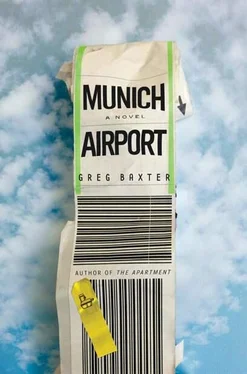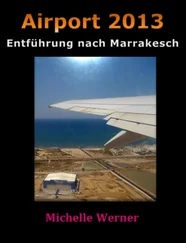My father left Miriam’s apartment, after our first visit, in a total fog, an incoherence that was massive and still. He never returned, though I would, three times, with the key that the landlady handed me out of a hope that I would clear up the mess. We walked slowly from Miriam’s apartment toward the square. My father walked alone, ahead of us. Trish walked behind him, right behind him, waiting, I presumed, for an opportunity to console him. The immediacy and magnitude of her affection for my father was a mystery. It seemed that her affection and his woe were symbiotic. They walked so slowly that I had time to stop and stare into the windows of stores and offices, a café, a dive bar, and through the open archways of apartment blocks. I was thirsty, I wanted some water, so I went inside a place that served takeout coffees and had a fridge full of drinks — it was not quite a café, not quite a convenience store, just an unadorned room for people to sit in and smoke cigarettes. There was one table, a counter, and four Turkish men who were smoking at the table. None of them wanted me there. Even after I had picked the water from the fridge and placed it on the counter, and taken out my change to count it, it took one of the four men an eternity to get up from his seat at the table and ask me if the water was all I wanted. His tone of voice suggested that if water was all I wanted, I should go somewhere else. So I got a coffee. By the time I ordered it, I actually wanted a coffee. But the coffee he served me came out of one of those machines where you put a cup in a grungy and stinking slot and push a button, and I did not feel like drinking it.
Once I got outside, I poured the coffee out and threw the cup in a trash can. I looked up and saw my father and Trish not too far ahead, approaching the main street, across which was the square. They stopped and waited for me. I didn’t rush. I drank my water. I thought, This is the street Miriam lived on, and every day she walked down from her apartment to the square, just as I do now. I almost took some photos with my phone, but after turning this way and that I realized I’d be better off misremembering it. The street was narrow. Some of the buildings, like Miriam’s, seemed derelict, even though they were not. There were trees, and I could imagine that in spring and summer, it would be pleasant. The road at the end was busy, and the square on the other side was crowded, there was a market full of junk. I caught up to them. Trish said, I think we should sit down. Let’s find a place to catch our breath, get coffee or a snack.
Let’s get away from this square, I said.
I agree, said Trish. I know a nice street a few stops up on the U-Bahn.
I’d rather walk, said my father.
I said, Trish has to get back to work, Dad.
My father looked at the sky, then back at me. Of course, he said.
We settled for a place along a bright, treeless street that was full of interesting cafés, bicycle shops, and places selling old cheap furniture. From the outside, it looked like a restaurant, but inside it was clearly something else. It had the dimensions of a railroad car, and it served kebabs and falafels and baked potatoes and slices of pizza and cheeseburgers. We should have turned around and picked another place along the street. We all seemed to be thinking the place was wrong, but nobody said it. My father put on his glasses to read the menu above the man behind the counter, and the man, as my father perused the items on the menu, seemed to grow impatient. All I really want is a coffee, I said. Trish got a slice of pizza. The man asked what she wanted on top, and she said, Oh, you know…He made a suggestion, and she said, That’s fine, some of that. My father got a baked potato. It came out so overcooked and soggy, however, and the toppings seemed so lifeless, that he set it aside. Trish nibbled at her pizza, but only after removing the toppings. Tomorrow, said my father, speaking to his set-aside potato, we should go see the Bundestag or something. Trish said, Oh, definitely, you should book at the café and you can skip the lines. My father said, It’s been such a long time since I’ve been in Berlin. Yes, such a long time, I was a student. I came to Europe quite often for a while, when I started teaching. When I started editing the journal I found I didn’t really have the time to travel, I don’t know, maybe I did, I could have come to Berlin to see Miriam, I never did.
I said, You came to Scotland, she didn’t make it.
My father looked distantly at his potato. I could see that he really did not like the potato, and wished it would go away. So I moved it.
Then Trish said, The Neue Nationalgalerie is also nice.
I’d like to hear the Philharmonic, said my father.
Me too, I said.
I can help you get some tickets, said Trish.
My father rapped the table with his knuckle — he was showing his approval. He asked Trish if Germany was a US foreign policy priority or a backwater. Something in between, she said. It was her first posting. She’d started late in the State Department because of her army career, but generally people in the Department thought Berlin was a solid posting, because it was a nice place to live and the embassy was busy and moderately important. Still, she would have rather gone to China or the Middle East. Her husband had hoped for London or Sydney, so he could find work. It must be difficult, said my father vaguely. Then he looked at me, and I wasn’t sure if he wanted confirmation, or if he wanted to accuse me of mishandling something far less difficult — a comfortable life in a nice apartment in London with a smart, pretty wife who had a good job and wanted kids — because he did not know anything about my wife or my marriage. So I said, Yes, must be difficult. Trish said, He found a job a few months ago, but it’s in Munich.
Without realizing it, I had begun to pick at my father’s potato — just the toppings. Lots of sliced, pickled jalapeños, which were not spicy, and which were not crisp. Chunks of unmelted cheese. Too much sour cream. An overdressed salad on the side. I only realized I was eating when I grabbed his fork and stuck it into the potato. I was half-alarmed. I said, I can’t believe it. What’s that? said my father. I thought about not saying anything, but then I said, Well, what else, that Miriam starved to death. My father’s eyes got very soft, and we waited to see if he had anything to say. He didn’t. But I had ruined lunch.
That first week, I rented a bicycle and returned twice on my own to Miriam’s apartment. My father met Trish for lunches and dinners, and even had an unexpected drink with the American deputy chief of mission — the second-in-command behind the ambassador — a history buff who seemed to think my father was a famous historian, and who wanted to express his sorrow about Miriam and assure my father that her case was special. My father told me the deputy ambassador also asked him what the Indo in Indo-European meant. He had always assumed it meant collective or entire . Then he laughed at himself for a while. It would have been a funny thing to say, admitted my father, on a different type of trip. Another thing the deputy ambassador kept saying was hot dog , with a swift emphasis on hot , then a long pause, then a slow and exhaling dog , without any excitement, whenever my father said anything interesting.
The first time I went back to Miriam’s apartment, I met a neighbor and old friend of Miriam’s. It was the day after I had been there with Trish and my father, another of those cold and perfectly clear mornings. I parked my bike outside Miriam’s place. I got a coffee in the square, and a squashed, tasteless croissant. I had two large canvas tote bags with me, in case I felt like rescuing some things. I didn’t plan on staying long. But as soon as I arrived, I realized I hadn’t any excuse to rush. And I was starting to adapt, already, to the pace of life in Berlin, which was much slower than that of London. I checked Miriam’s mailbox. There was a newspaper in it, some advertising leaflets, and a letter that looked official. I threw everything in a bin that was beside the mailboxes and was already overstuffed with newspapers and advertising. I had to cram them in, push them down hard and hold them down. A woman came down the steps, saw me, and appeared disgusted, but I wasn’t sure what had disgusted her. Three weeks later, I have come to realize that the look of disgust is just the way Germans look at each other.
Читать дальше











